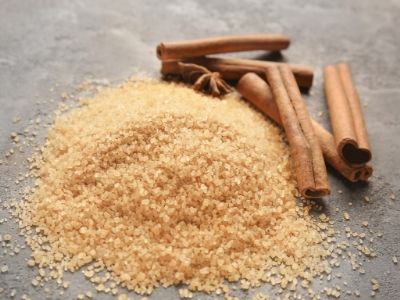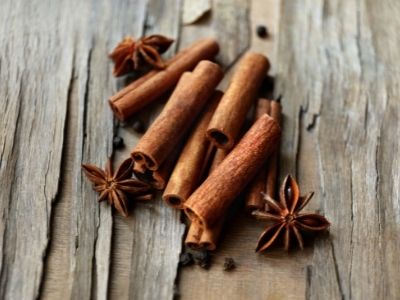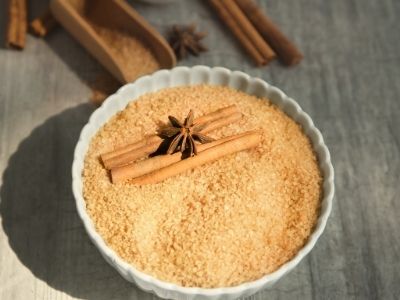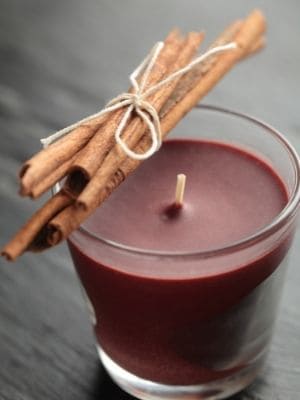Cinnamon has to be one of the most popular spices found in any kitchen cupboard. We enjoy the smell in cakes, candles, mulled wine, and more. But, with all these baked goods, lit candles, and more, we have to consider the possible fire risk. Is cinnamon flammable and, if so, what do we need to watch out for?

Cinnamon is flammable and in certain forms can be dangerous. Cinnamon contains vital compounds necessary to give its scent but these also allow it to burn quite well. If unchecked, it can be a source of massive dust explosions that are highly dangerous.
To better understand the fire risks of cinnamon, we need to look at this substance in a different light. Cinnamon comes in many forms and its use in scented products, as well as cooking, can lead to some confusion.
There are enough fire safety issues for homeowners and fire departments to worry about in winter without adding cinnamon-related mishaps to the list. So, let’s look at the following points in more detail to know what is safe and what to avoid.
- The risks of cinnamon powder when used in cooking and its role in dust explosions
- The use of dried cinnamon sticks as firelighters
- The use of cinnamon as a form of incense
- The dangers of using cinnamon sticks in candle making
Table of Contents
The two types of cinnamon
Before we look at the different ways of using cinnamon, and its potential fire risks, we need to remember that there are two different forms.
When many people talk about cinnamon, they talk about the little sticks of dried bark that have a delicate earthy scent and are great for seasonal decorations.
The wood-like structure means that they look like perfect fire-lighting materials with potential uses in different circumstances.
The other form is cinnamon powder.
This is the fine substance that you may have in your spice rack with a strong scent and that great cinnamon taste. This is what we use in baking to add cinnamon flavor to rolls, pies, and anything else we can think of.
At their core, the two forms come from the same source and have some of the same components. This is why both types of cinnamon are flammable.
Why is cinnamon so flammable?
The flammable nature of cinnamon comes from some of the important compounds within. Cinnamon contains cinnamaldehyde, and this is responsible for its brilliant scent.
This ingredient can also be pretty potent, with the essential oil of cinnamon bark containing around 90% cinnamaldehyde.

However, both cinnamaldehyde and eugenol – also present – are volatile chemicals and ignite at low temperatures.
Therefore, it doesn’t take much for cinnamon to burn. Also, some forms of cinnamon that are desirable for their heightened scent could well have higher levels of this compound.
What are cinnamon powder dust explosions?
The other fire risk comes from cinnamon powder dust clouds.
These situations are rare, especially outside of industrial settings, but accidents can happen.
In fact, there was a case not too long ago in Denmark, where a coming of age ritual involving cinnamon dust resulted in a freak fireball.
Dust explosions happen when a concentration of fine particles reacts with oxygen in a contained environment and ignites.
You can see similar explosions in flour mills, sugar plants, and coal mines. They are rare because you need the right conditions and a lack of ventilation. But, they can also be devastating.
How dangerous is cinnamon powder in a kitchen?
Thankfully, you don’t have to worry about the cinnamon powder in your spice rack becoming a fire safety issue.
It is very unlikely that you will ever use enough and create those sorts of environments to generate those dust clouds.

You should have no problem sprinkling some cinnamon into a mixing bowl to enhance your baking mixture. The ratio of dust to air in your kitchen isn’t going to be dangerous.
Can you use cinnamon sticks as fire starters?
Moving on to those cinnamon sticks now, there are questions over their potential for starting or maintaining fires.
This is due to the fact that they are basically pieces of dried wood so should perform in a similar way to firewood and other fire starters. There are people that have no problem adding cinnamon sticks to their fireplace or fire pit, along with other materials like pine cones.
The dried material should burn well without any additional risks. You just need to make sure that you add these pieces carefully, are always in full control of the fire, and never allow children to have a go themselves.
Can you use cinnamon sticks as incense?
A common question related to the flammable nature of cinnamon sticks is whether cinnamon sticks make good incense sticks.
It is possible to use a cinnamon stick as incense, and there are people with an interest in healing and spells that do so regularly to inhale the beneficial scent. However, you need to be very careful here.
There are longer cinnamon sticks that you can buy that are different from the more decorative ones. These should burn well in the right holder.
But, you need to make sure they aren’t unattended and are well away from other flammable materials.
If you really want incense that smells of cinnamon but you aren’t confident to use the real sticks safely, go for a product with an artificial fragrance.
Why should you boil cinnamon instead of burning it?
There are other ways to bring the wonderful fragrance of cinnamon into your home instead of adding fire hazards to your room.
If you are interested in getting a real cinnamon instead of artificial room scents then you can either create the scent through baking with it or boil up some ingredients and let those aromas permeate the air.
This is a great way to create natural festive scents without dealing with any open flames. All you need to do is get some cinnamon sticks, citrus peel, cloves, and other ingredients that signify the winter season.
Let them simmer and the scent will soon fill the home. You could always go a step further and use these ingredients in wine for mulled wine.
Why is cinnamon so dangerous in candle-making?
If you were to look up cinnamon candle-making online, you would quickly see lots of images and blog posts with candles using real cinnamon sticks.
Some talk about using the cinnamon in the candle like a wick while others simply surround the candle with a wall of sticks.

The problem here, as with any flammable material, is that they could catch alight if the flame gets out of control or blows the wrong way. It is a bad idea to bring real cinnamon into candle making when you can’t control how it will behave.
The same is true for any trends involving lit cinnamon sticks in cocktails. They may look cool but could easily get out of hand.
How to make candles smell of cinnamon.
You may ask how you get scented candles that smell like cinnamon if cinnamon is so dangerous to use. Candle making tends to rely on oils and extracts added to the wax.
These ingredients often have a more potent scent that then diffuses into the air and creates that aroma.
Dyes, either natural or synthetic, can then create the illusion of a stronger concentration of cinnamon in the candle. Look out for natural cinnamon extract when making candles at home and be aware that many store-bought items could be synthetic.
Is cinnamon a fire hazard?
This is an important question to end on here because there are such different answers depending on the situation. Cinnamon sticks are so common in scented products like potpourri, especially in the winter holiday, that we take them for granted.
But, in the wrong hands, they can burn and become a fire risk. Add them to garlands and decorations or boil them for scent, but don’t burn them indoors.
Again, there are two sides to cinnamon powder. As a basic culinary ingredient in the kitchen, it is fine. Once you start generating massive cloud or putting it in open flames it is more dangerous.
The best way to summarize this guide is to say that we shouldn’t underestimate the flammability of cinnamon but we shouldn’t get rid of it from our homes either.
It is important to be aware of the dangers of adding cinnamon sticks or powder to open flames and to refrain from deliberately burning them.
Cook with it, use its scent in other ways, and find alternative ways to make those cinnamon candles. It isn’t worth the risk of a house fire to add a pretty band of sticks around a scented candle for Christmas.